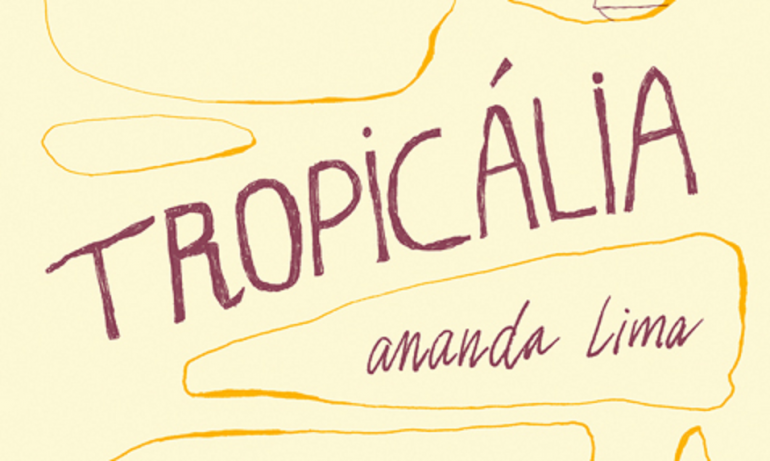Tropicália is a book that doesn’t pull its punches or steer away from the absurd, pulling in readers from the first line, “She devoured tiny Americans that came out of vending machines.” Ananda Lima’s three-part, lyrical prose collection takes its name from the 1960’s Brazilian counterculture movement of the same name. Tropicália or ‘“Tropicalismo” sought to play upon images of Brazil being that of a “tropical paradise” while serving as a “field for reflection on social history.” Concurrently, this spawned the “Anthropophagic Manifesto” by Oswaldo de Andrade which proposes that Brazil’s history of “cannibalizing” other cultures is its greatest strength and should be used to counter European postcolonial cultural domination. Oswaldo is quoted as saying “I’m only interested in what is not mine.”
“Antropófago,” the title of the opening story, means to be cannibalized by culture. This narrative follows Béia, a nurse, and her experiences at the hospital she works at. Lima employs recurring magical realism techniques throughout the story, as the almighty American consumerism takes on an almost surreal absurdist quality, with Béia swallowing everyone from “an aging Southern belle – blond, skinny, and lipstick – in tasteful clothes” to “a bearded hipster holding a bottle of craft beer.” A recurring theme revolves around how Béia absorbs vending machine American culture and is destroyed from within as she “eats different Americans” and loses a little bit of herself in the process—it’s the immigrants’ struggle of assimilation without losing their identity.
Lima also uses environmental themes to juxtapose the natural and the synthetic. Vibrancy is associated with the Brazilian culture, “The air is thick with spices. A mixture I can’t properly identify (tamarind? turmeric? saffron?) coming from somewhere within my building,” while the American culture is bland, plastic and fake like “Emergency bags” “plastic” and “soda cans.” How Béia interacts with her environment mirrors the immigrants’ relationship with their adoptive culture. Rampant consumerism, like the consumption of Americans out of vending machines, is destroying the planet as well as metaphorically consuming American culture.
The title story of the collection, “Tropicália,” starts off with quotes by both Brain Gremlin from Gremlins II and Oswaldo de Andrade, which lay the foundations for the most riveting story of the collection that follows the character Val’s quest to find her passport. While the entire story takes place over four days: August 9th, 18th, 19th and 21st, Lima opts to play with time, using the moon’s phases to dictate feelings of surrender “Friday, August 18: Waning Crescent” and “Saturday, August 19: Waning Crescent,” potential growth “Wednesday, August 9: Waxing Gibbous,” and ending with new beginnings on “Monday, August 21st: New Moon.”
In lieu of telling the story chronologically, Lima prefers to skip around and weave the emotions of Val’s journey into a complex journey. For instance, on days where the moon is a “Waning Crescent,” Val faces immigration issues such as the stress of losing her passport, discovering her boss is racist, or that she is another in a line of Latin women in the life of Mike, the white man she is seeing. A common thread between stories is the anxiety of the attempted repeal of DACA and its repercussions throughout both “Antropófago” and “Tropicália.” While Béia’s experience in “Antropófago” is confined in the background to “the emergency room, patients waited to the sound of the TV. Two angry, blonde women screamed about DACA on Fox News,.” Val is constantly haunted by and dealing with the repercussions of anti-immigrant policies in “Tropicália.” In one of the first scenes in the story, she checks the Brasileiros de Nova Iorque Facebook group and sees “fifty comments on a post by a woman thinking about divorce but afraid for green card application.” The internet’s lack of empathy is well documented, but it still leaves the reader’s blood boiling at the rude and discouraging comments thrown at the woman’s post. Yet the most egregious lack of empathy is mirrored in a comment by Val’s boss, Meredith, when she receives her promotion. “The other guy, Eduardo, he turned out…to be DACA, and you know.”
This contrasts with Val’s seemingly hopeful attitude as she vies for a promotion at work and meets Mike, a new love interest that comes with the moon being a “Waning Gibbous.” Of course, chronologically these scenes take places a few days before her world is flipped upside down and she loses her passport, an item that tethers her to America even when the Americans in her life seem to treat her as lesser than or just an object of their lust. A not-so-subtle theme throughout “Tropicália” is the gremlins from Gremlins II as a type of immigrant. In fact, “Tropicalia” starts off with Brain Gremlin saying, “We want to be civilized” which feels like a translation of feelings that immigrants want to become legal, hardworking citizens of the United States. In an early scene that takes place the night Val meets Mike, she makes a similar mental comparison “The creatures performed and ran amok to the sound of Sinatra, as the terrified humans did whatever they could to keep them from coming out of their dark glass enclosure – and now, here I was.”
Lima masterfully sandwiches in “Porcelain” between her two stories focusing on immigration. While it may seem like a comedic reprieve in line with the absurdities pushed by the “Antropófago” movement, it could be interpreted as a metaphor for America’s view of immigration, for example: “… he saw the rat, surrounded by white glazed porcelain and water. It looked back at him with a wet expression of animal incomprehension, which partially mirrored his. Though his confusion was human, which was more pitiful, made more pathetic by the fact that humans like to think of themselves as an understanding species.”
In “Porcelain,” the toilet central to the story could be read as America, a metaphorical place where “Here I [America] have nothing to hide.” It’s easy to see this story as a reimagining of immigrants as coming up “the sewer” and coming to face with the liberal “hipster man from Brooklyn, who’d never killed anything and sounded like a decent enough guy.” Yet, instead of finding safety in an ally, the rat meets its demise at the hands of a hairbrush.
Contrast the porcelain toilet with “so I used to have tea on the weekends. I like how fancy it feels. I like the contrast of the small purple and pink flowers with the white porcelain. I like the fading golden rim around the cup’s lips.” This strange juxtaposition feels like a projection pushed onto the rat in the toilet, a desire to be the man greeted by the rat instead of the vermin in the porcelain bowl. “I wouldn’t have killed the rat, at least I think I wouldn’t have.”
Tropicalia starts and ends with the tinge of home that comes with the darkness of a new moon and watching a cockroach run between trash piles of crumpled Americans fresh from a vending machine: “I feel a tenderness for it. Everyone wanting to squash it dead.” Lima’s book demands to be read as America finds itself at a crossroads that will shape the country for generations. For everyone who knows or is an immigrant and the anti-immigration policies of America, Tropicalia is a lyrical collection that will resonate for years to come.





